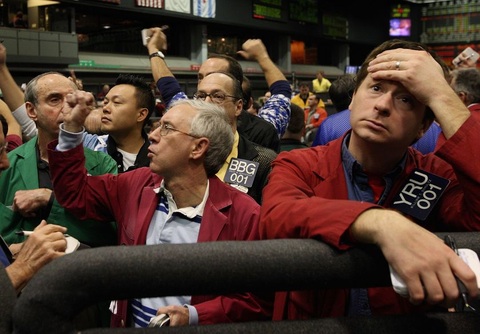SOURCE: DAVID WARD sayjaz3@hotmail.com
POSTED: 9 OCTOBER 2008 - 6:30pm HST
The End of Growth

image above: Traders at the Chicago Mertantile Exchange. Photo by Scott Olsen
| by Richard Heinberg on 9 October 2008 http://postcarbon.org Several of us who have been watching the world oil production and depletion picture closely for the last few years are now concluding that the world has now seen the highest rate of production ever. Matt Simmons agrees: It’s all downhill from here. The worldwide financial crisis, and the decline in available energy, mean that we may also have seen the final year of aggregate world economic growth. This is a breathtaking statement. I found myself uttering it yesterday at a strategy meeting of some environmental and economic justice organizations organized by the International Forum on Globalization; I surprised even myself, and immediately began wondering whether what I had said could possibly by true. There are obvious objections. Perhaps the wealthy nations could still wring out a few years of growth by increasing global economic inequality. But this is essentially what they did over the past two decades with the strategy of corporate globalization—and that strategy is losing steam because of high transport costs due to Peak Oil. Perhaps economic growth could still be maintained by smoke and mirrors—in either a good or a bad way. All that would be necessary is a little fiddling with the definition of “growth.” Just look at how the US government has altered its way of defining “inflation” over the years by largely excluding energy and food prices: if the old rules were still in place, the country would be seeing double-digit inflation. The same has happened with “unemployment.” Why not “growth”? On the other hand, growth really should be redefined. Many organizations have been pressuring governments and official agencies to measure growth not with GDP, but with a mixture of indicators related to public health, education, environmental integrity, and so on (the Genuine Progress Indicator is one suggested alternative scheme). If world governments decided to redefine growth this way, and then actually funded improvements in public services, perhaps growth could indeed continue. A final objection has to do with regional impacts of the economic crisis. Some would argue that the growth momentum of China is such that it cannot be stopped immediately, and will therefore continue to contribute to overall global growth for the foreseeable future. Others might point out that the oil exporting nations are likely to continue experiencing high rates of growth as prices of fuel eventually resume their stratospheric climb. But will China or Saudi Arabia be able to offset the economic collapse of the US and Europe? And will China be immune for long? The more I think about it, the more it seems to me that my blurted comment may be right. Growth is gone. Over. Kaput. Finished. Get used to it. If so, there will be an ocean of consequences. For those in the tiny universe of environmental NGOs, one of the consequences is this: The time for arguing against economic growth may be over. Yes, everyone who understands our human impact on the environment, and the disastrous implications of our economic growth imperative, knows that it is absolutely essential that the world find an alternative to growth; that instead, the human economy must contract to a point that it no longer threatens the viability of ecosystems. This is the essence of sustainability. But imagine yourself talking to someone who has just lost her job. You tell this person, “You need to voluntarily further reduce your income and standard of living.” How’s that likely to go over? Effective strategy demands recognition of the opportunities and limits of the unique historical moment. It seems that we have just moved from one historic moment to a very different one. In this situation, it’s more helpful to tell people (including policy makers) how to effectively deal with their immediate problems in a way that is consistent with long-term sustainability. Anything else will be irrelevant at best, extremely unwelcome at worst. Growth is dead. Let’s make the most of it. A crisis is a terrible thing to waste. |
SOURCE: DAVID WARD sayjaz3@hotmail.com
POSTED: 13 SEPTEMBER 2008 - 9:00am HST
The Dress Rehearsal Is Over

image above: Don't reset the snooze alarm!
by Richard Heinberg on 11 September 2008 at http://postcarbon.org |
see also:
Island Breath: The Long Descent 9/2/08
Island Breath: The Long Emergency has begun 10/29/07
Island Breath: Kunstler 2007 Predicition 1/2/2007
Island Breath: Kunstler 2006 Observations 11/13/06
Island Breath: Salvage Sociaties 10/28/07
Island Breath: Scarcity Industrialism 10/17/07
Island Breath: Power Down Revisitied 10/17/07
Island Breath: Part 1 - 2050 Introduction
Island Breath: Part 2 - Kauai 2007 to 2029
Island Breath: Part 3 - Kauai 2020 to 2050